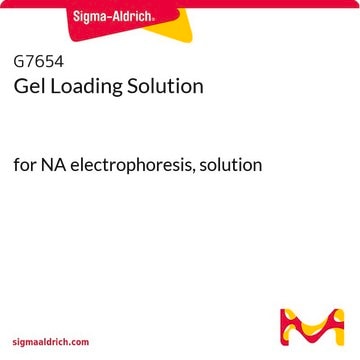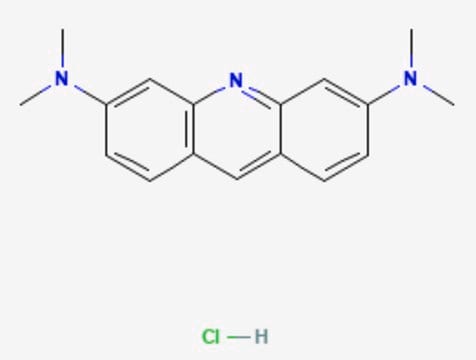E1385
Ethidium bromide solution
BioReagent, for molecular biology, 500 μg/mL in H2O
Sinónimos:
3,8-Diamino-5-ethyl-6-phenylphenanthridinium bromide, EtBr, Homidium bromide
About This Item
Productos recomendados
grade
for molecular biology
Quality Level
product line
BioReagent
concentration
500 μg/mL in H2O
technique(s)
electrophoresis: suitable
suitability
suitable for gel electrophoresis
SMILES string
[Br-].CC[n+]1c(-c2ccccc2)c3cc(N)ccc3c4ccc(N)cc14
InChI
1S/C21H19N3.BrH/c1-2-24-20-13-16(23)9-11-18(20)17-10-8-15(22)12-19(17)21(24)14-6-4-3-5-7-14;/h3-13,23H,2,22H2,1H3;1H
InChI key
ZMMJGEGLRURXTF-UHFFFAOYSA-N
¿Está buscando productos similares? Visita Guía de comparación de productos
Application
Biochem/physiol Actions
Reconstitution
Related product
Storage Class
12 - Non Combustible Liquids
wgk_germany
nwg
flash_point_f
Not applicable
flash_point_c
Not applicable
Certificados de análisis (COA)
Busque Certificados de análisis (COA) introduciendo el número de lote del producto. Los números de lote se encuentran en la etiqueta del producto después de las palabras «Lot» o «Batch»
¿Ya tiene este producto?
Encuentre la documentación para los productos que ha comprado recientemente en la Biblioteca de documentos.
Los clientes también vieron
Contenido relacionado
Ethidium bromide is a well-known and widely used fluorescent dye in biotechnology research.
Ethidium bromide is a well-known and widely used fluorescent dye in biotechnology research.
Ethidium bromide is a well-known and widely used fluorescent dye in biotechnology research.
Ethidium bromide is a well-known and widely used fluorescent dye in biotechnology research.
Nuestro equipo de científicos tiene experiencia en todas las áreas de investigación: Ciencias de la vida, Ciencia de los materiales, Síntesis química, Cromatografía, Analítica y muchas otras.
Póngase en contacto con el Servicio técnico








